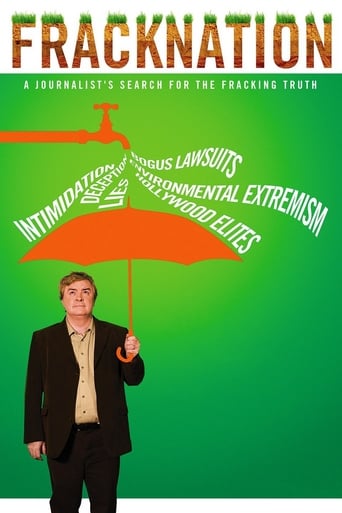Incannerax
What a waste of my time!!!
Lovesusti
The Worst Film Ever
SnoReptilePlenty
Memorable, crazy movie
Mjeteconer
Just perfect...
makoxl
I've watched hundreds of documentaries and this has to be the most blatant example of an attack-docu. Let's be honest about the topic, 99.9999% of people don't know anything about this but it seems that a lot of people in this movie and it's counterpart are able to speak on the topic in great depth. Bringing Russia into this documentary as a main topic is pretty weak in general, almost desperate!This movie is so bad it's worth watching. I don't give a frack about either side of the debate but this movie makes me want to be anti- fracking. Frack this piece of fracking ****.
TheBlueHairedLawyer
Do you think environmentalists are peaceful, earth-loving guys trying to create a better place to live? Well, you're dead-wrong, and this guy proves it! To anyone who says he was paid off by oil companies, he wasn't, that's silly and he would have been caught by now if this were a true fact. These reviews are coming from the environmentalists who are too scared to face the truth. And like this guy has had, gun threats, questioning environmentalists, I've had it happen, too. I litter on purpose and spray chemicals on my lawn and toss dead batteries in the woods. When an environmentalist catches me, do they work out a peaceful compromise? No, they threaten, bring up that they're planning supposed murder and then lecture as if they're geniuses! Why is this? Because they're scared to admit that there's a possibility they could be wrong. And I'm not the only one out there who loves pollution and hates the environment, there are other people like me. This guy isn't an earth-hater like I am, he just wanted the truth and questioned a boatload of know-it-alls who turn out to maybe not know what they think they know. It was unbiased and factual and I'm pretty disgusted to see so many reviewers who are so narrow-minded to not even give this great documentary a chance. Watch it, you might learn something.
Dave
I have taken years' worth of courses at my University on energy resource processing and climate change. I have studied the topic of fracking extensively and exhaustively. GasLand promotes so much garbage disinformation, bad science and hogwash propaganda, that I don't even know where to start.Let's start by saying that one dangerous chemical used in fracking is dihydrogen monoxide which is a primary component of rocket fuel and a high-temperature welding gas and kills hundreds of people each year (including children) through accidental ingestion of large amounts. Dihydrogen monoxide also reacts vigorously if exposed to any electrical current, creating two highly explosive gases (through electrolysis), potentially blowing up your home! You do not want your children anywhere near this … if you think lighting a methane fire in your faucet is bad enough, just wait.But I was just bulls**iting you! Because dihydrogen monoxide is the chemical name for water (H20). Hundreds die each year by drowning, and electricity splits the H(ydrogen) and O(xygen) apart; liquid hydrogen is pure rocket fuel, and pure oxygen is used in welding. Electrolysis is the process of splitting the H and O, two highly combustible gasses, one of which can suffocate you, and both of which (if combined) can drown you.So just as with my example above, GasLand puts together a neat bag of bulls**t, makes it sound scientifically accurate, and stupid people buy it. There are notable risks associated with fracking. But if we de-blow those risks back into proportion, using scientific and reasonable analysis, we find that the risks of fracking are in fact much less then that of oil drilling. Oil drilling has caused, and currently poses much more serious risks (Deepwater Horizon, Valdez spills ring a bell?) that don't seem to be serious enough for an OilLand documentary. Moreover, wouldn't we want to be self-sufficient in energy production and break the chains of our middle East reliance?NO I do not work for an oil company, but YES I have spent hundreds of hours studying the subject, for which I can speak for hours on … so contact me should you want an in-depth discussion of the risks (abnormal seismic activity?) …I'll end with a FUN FACT: Did you know Global Warming was changed to 'Climate Change' after a team of researchers found that people were skeptical of 'Global Warming' but believed in 'Climate Change' – so politicians were instructed to replace 'Global warming' with 'Climate change' in speeches, and the trick worked. People supported climate change but not global warming, even though they're identical terms.So what gas companies need to do is slightly modify their extraction method and declare "Were not going to engage in fracking any longer, it's too dangerous … were reverting to 'standard natural gas drilling' from now on." Case closed.
Doug Cunningham
It was nice to hear the other side of the story. I'm sick of the 1% (actors and rich politicians) manipulating our information to fit their agendas. There are too many groups in our country who wish to censor opposition rather than have a calm debate over the facts. Why wouldn't you welcome investigations by multiple source to prove your point? America needs more debate and information free of censorship. This documentary was well produced. It really showed how we in America can be managed by a biased media. Actors who are either uninformed or have their own agenda push questionable information. We need to question the information put before us rather than viciously supporting it and tearing down opposition. This film does exactly what we all need to do. When presented with information first ask if it's true. Seek out other sources that support or disprove the information. To be clear, I'm not saying I believe this documentary 100%. Only that it's nice to hear another point of view.

